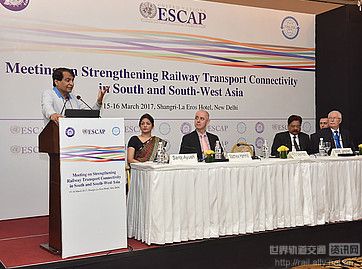Istanbul – Dhaka – Yangon corridor plan to improve South Asia rail connectivity
2017-03-20 16:37:00
ASIA: Officials and policy makers from Afghanistan, Bangladesh, Bhutan, India, Iran, Kazakhstan, Myanmar, Nepal, Pakistan, Russia and Turkey attended a conference on March 15-16 to discuss proposals to improve international rail connectivity in South & Southwest Asia.
The event in Delhi was organised by United Nations Economic & Social Commission for Asia & the Pacific, the Organisation for Co-operation between Railways and India’s Ministry of Railways. The aim was to inform participants about the work of ESCAP and related organisations, to explain OSJD’s role and to agree the next steps for improving cross-border rail connections.
Matthew Hammill, acting head of ESCAP’s South & Southwest Asia Office, said consultations with stakeholders had identified a rail corridor which would link South & Southwest Asia to Central Asia and Europe. A proposal for ‘seamless rail connectivity’ would extend the Istanbul – Tehran – Islamabad route which has been used by container trains onwards to serve Delhi, Kolkata and Dhaka. This ITI-DKD corridor could be furthered extended to Yangon to become the ITI–DKD-Y Rail Corridor, forming a key part of the Trans-Asian Railway network that is backed by ESCAP member states.
Participants at the conference discussed regional initiatives to complete missing sections of infrastructure, and the Regional Co-operation Framework for Facilitation of International Railway Transport which could help overcome operational and non-physical barriers to the use of existing infrastructure.
‘International rail transport connectivity can potentially become one of the largest sources of growth and development in southern Asia’, said India’s Minister of Railways Suresh Prabhu. ‘Physical connectivity is required for market integration’, he added, pointing out that ‘railways can transport huge capacity compared to
